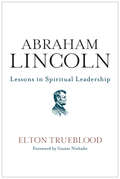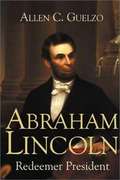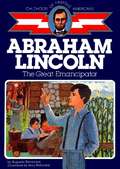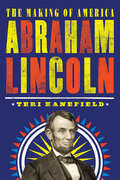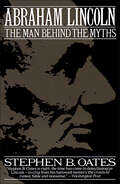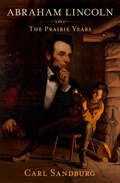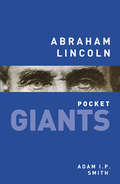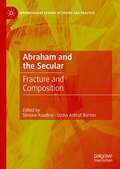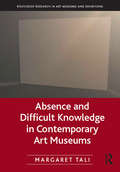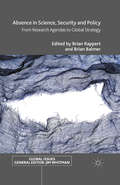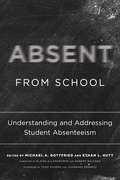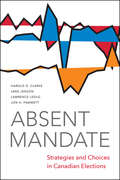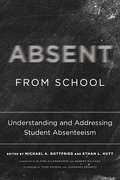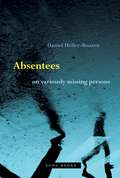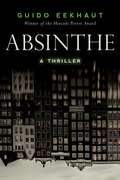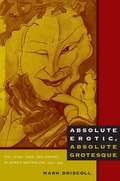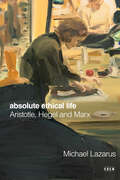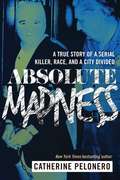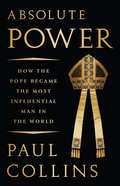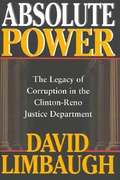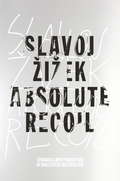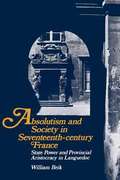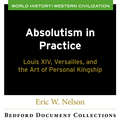- Table View
- List View
Abraham Lincoln: Lessons in Spiritual Leadership
by Elton TruebloodMany writers have explored Lincoln's leadership; others have debated Lincoln's ambiguous religious identity. But in this classic work, Christian philosopher and statesman Elton Trueblood reveals how Lincoln's leadership skills flowed directly from his religious convictions—which explains how the president was able to combine what few leaders can hold together: moral resoluteness with a shrewd ability to compromise; confidence in his cause while refusing to succumb to the traps of self-righteousness or triumphalism; and a commitment to victory while never losing sight of his responsibility for—or the humanity of—his enemy. These rich meditations offer deep wisdom and insight on one of the most effective leaders of all time.
Abraham Lincoln: Redeemer President
by Allen C. GuelzoThis major biography of Abraham Lincoln has won the prestigious Lincoln Prize, the annual award given to the best book in the Civil War field. Guelzo's superb work breaks new ground in exploring the role of ideas in Lincoln's life, treating him for the first time as a serious thinker deeply involved in the struggles of nineteenth-century thought.
Abraham Lincoln: Sixteenth President Of The United States
by Rebecca StefoffSurveys the childhood, education, employment, and political career of the Civil War president.
Abraham Lincoln: The Great Emancipator (Childhood of Famous Americans Series)
by Augusta StevensonUsing simple language that beginning readers can understand, this lively, inspiring, believable and fictionalized biography looks at the childhood of America's sixteenth president.
Abraham Lincoln: The Making Of America #3 (The Making of America)
by Teri KanefieldThis biography for young readers examines the life of the sixteenth U.S. president and the constitutional issues that arose during his administration.Praise by many as America’s greatest president, Abraham Lincoln guided the country through the Civil War and was the Great Emancipator who freed the enslaved and paved the way for the Thirteenth, Fourteenth, and Fifteenth Amendments. Lincoln was denounced by others as a tyrant who trampled the Constitution, denied individual liberty, and failed to avert the war that left more than six hundred thousand American soldiers dead.Born in a cabin deep in the backwoods of Kentucky, growing up in a family considered “the poorest of the poor,” Lincoln rose to become a highly respected lawyer and stateman. He often used different arguments with different people depending on the needs of the moment, leading one exasperated opponent to call him two-faced, and leaving others to marvel at his effectiveness as a politician and leader.A practical statesman and not an idealist, Abraham Lincoln knew he could not accomplish all he set out to do, but he remained alert for opportunities to achieve his long-desired objective of liberty and justice for all.The book includes selections of Lincoln’s writing, a bibliography, and an index.“This concise and balanced narrative encapsulates the life and legacy of one of the country’s most important leaders. . . . A solid addition for understanding America’s story.” —Kirkus Reviews“The author adroitly reviews the facts of Lincoln's entire life, divided into 16 chapters, and examines his emergence as a politician and his views on slavery.” —School Library Journal
Abraham Lincoln: The Man Behind the Myths
by Stephen B. OatesA biographical study of the 16th U.S. president, and an essential book for any student of Lincoln and American history.In this multifaceted portrait, Oates, “the most popular historical interpreter of Lincoln” (Gabor S. Boritt, New York Times Book Review), exposes the human side of the great and tragic president—including his depression, his difficulties with love, and his troubled and troubling attitudes about slavery—while also confronting the many legends that have arisen around “Honest Abe.” Oates throughout raises timely questions about what the Lincoln mythos reveals about the American people.Praise for Abraham Lincoln“There is no better introduction to current thinking about Lincoln and his place in history. . . . Oates, author of the best one-volume biography of Lincoln of our time, scales Lincoln down to human size yet solidifies his reputation as one of our greatest presidents. . . . Oates’ Lincoln fascinates. He is both flawed human being and genuine hero.” —Newsday“Oates re-creates the life and world of Abraham Lincoln with the skill of a master painter. He succeeds in portraying both the facts and myths of history as essential to our understanding it.” —Christian Science Monitor
Abraham Lincoln: The Prairie Years (American Roots Series)
by Carl SandburgThis definitive, single-volume edition of the Pulitzer Prize–winning biography delivers &“a Lincoln whom no other man . . . could have given us&” (New York Herald Tribune Book Review).Celebrated for his vivid depictions of the nineteenth-century American Midwest, Carl Sandburg brings unique insight to the life of Abraham Lincoln in this distinguished biography. He captures both the man who grew up on the Indiana prairie and the president who held the country together through the turbulence and tragedy of the Civil War.Based on a lifetime of research, Sandburg&’s biographywas originally published as a monumental, six-volume study. The author later distilled the work down to this single-volume edition that is considered by many to be his greatest work of nonfiction.
Abraham Lincoln: pocket GIANTS (Pocket GIANTS)
by Adam I.P. SmithThe President who ‘freed’ the slaves and held the Union together in the face of the slaveholding South’s bid to create a separate Confederacy. The teller of ribald stories, and the author of the most sublime speeches in the English language. A clever, complex, secretive man who rose from frontier obscurity to become the central figure at the moment when the United States of America came close to disintegration.Was Lincoln the ‘Great Emancipator’, whose wartime leadership helped free four million enslaved people? Or was he a nationalist who jumped late on the antislavery bandwagon? Was his intransigence the cause of much bloodshed? Or was he a pragmatist whose leadership minimised the destruction of the war?.This concise biography situates Lincoln in his time and place. A very human figure who, after his assassination by a leading Shakespearean actor, was turned into an icon.
Abraham and the Secular: Fracture and Composition (Interreligious Studies in Theory and Practice)
by Simone Raudino Uzma Ashraf BartonThis volume offers both theoretical approaches and case studies on the relationship between religion and the secular world. Bringing together contributions from seasoned authors, religious leaders, and brilliant new scholars, it frames the long-standing debate on how to structure a comparative representation of any religion on the one side, and the secular world on the other. Often, the very act of comparing religions exposes them to an assessment of their role in history and politics, and risks leading to some sort of grading and ranking, which is highly unproductive. By candidly discussing the relation between religion and the secular and providing concrete examples from four case studies (Christianity, Islam, Judaism, Baha’I’), this book provides an important reference on how this can be achieved in a neutral way, while keeping in mind the normative finality of seeking conciliation to existing fractures, both within and among religions.
Absence and Difficult Knowledge in Contemporary Art Museums (Routledge Research in Art Museums and Exhibitions)
by Margaret TaliThis book analyzes practices of collecting in European art museums from 1989 to the present, arguing that museums actualize absence both consciously and unconsciously, while misrepresentation is an outcome of the absent perspectives and voices of minority community members which are rarely considered in relation to contemporary art. Difficult knowledge is proposed as a way of dealing with absence productively. Drawing on social art history, museology, postcolonial theory, and memory studies, Margaret Tali analyzes the collections of four modern and contemporary art museums across Europe: the Hamburger Bahnhof in Berlin, the Ludwig Museum of Contemporary Art in Budapest, the Kiasma Museum in Helsinki, and the Kumu Museum in Tallinn.
Absence in Science, Security and Policy: From Research Agendas to Global Strategy (Global Issues)
by Brian Rappert Brian BalmerThis book explores the absent and missing in debates about science and security. Through varied case studies, including biological and chemical weapons control, science journalism, nanotechnology research and neuroethics, the contributors explore how matters become absent, ignored or forgotten and the implications for ethics, policy and society.The chapter 'Sensing Absence: How to See What Isn't There in the Study of Science and Security' is open access under a CC BY 4.0 license via link.springer.com.
Absent Citizens
by Michael J. PrinceDisability exists in the shadows of public awareness and at the periphery of policy making. People with disabilities are, in many respects, missing from the theories and practices of social rights, political participation, employment, and civic membership. Absent Citizens brings to light these chronic deficiencies in Canadian society and emphasizes the effects that these omissions have on the lives of citizens with disabilities.Drawing together elements from feminist studies, political science, public administration, sociology, and urban studies, Michael J. Prince examines mechanisms of exclusion and inclusion, public attitudes on disability, and policy-making processes in the context of disability. Absent Citizens also considers social activism and civic engagements by people with disabilities and disability community organizations, highlighting presence rather than absence and advocating both inquiry and action to ameliorate the marginalization of an often overlooked segment of the Canadian population.
Absent From School: Understanding And Addressing Absenteeism
by Elaine Allensworth Robert Balfanz Todd Rogers Michael Gottfried Ethan Hutt Johannes DemarziIn Absent from School, Gottfried and Hutt offer a comprehensive and timely resource for educators and policy makers seeking to understand the scope, impact, and causes of chronic student absenteeism. The editors present a series of studies by leading researchers from a variety of disciplines that address which students are missing school and why, what roles schools themselves play in contributing to or offsetting patterns of absenteeism, and ways to assess student attendance for purposes of school accountability. The contributors examine school-based initiatives that focus on a range of issues, including transportation, student health, discipline policies, and protections for immigrant students, as well as interventions intended to improve student attendance. Only in the past two or three years has chronic absenteeism become the focus of attention among policy makers, civil rights advocates, and educators. Absent from School provides the first critical, systematic look at research that can inform and guide those who are working to ensure that every child is in school and learning every day.
Absent Mandate: Strategies and Choices in Canadian Elections
by Jane Jenson Harold Clarke Larry LeDuc Jon PammettAbsent Mandate develops the crucial concept of policy mandates, distinguished from other interpretations of election outcomes, and addresses the disconnect between election issues and government actions. Emphasizing Canadian federal elections between 1993 and 2015, the book examines the Chretien/Martin, Harper and Trudeau governments and the campaigns that brought them to power. Using data from the Canadian Election Studies and other major surveys, Absent Mandate documents the longstanding volatility in Canadian voting behaviour. This volatility reflects the flexibility of voters' partisan attachments, the salience of party leader images, and campaigns dominated by discussion of broad national problems and leaders rather than by coherent sets of policy proposals. The failure of elections to provide genuine policy mandates stimulates public discontent with the political process and widens the gap between the promise and the performance of Canadian democracy.
Absent from School: Understanding and Addressing Student Absenteeism
by Todd Rogers Johannes DemarziIn Absent from School, Gottfried and Hutt offer a comprehensive and timely resource for educators and policy makers seeking to understand the scope, impact, and causes of chronic student absenteeism. The editors present a series of studies by leading researchers from a variety of disciplines that address which students are missing school and why, what roles schools themselves play in contributing to or offsetting patterns of absenteeism, and ways to assess student attendance for purposes of school accountability. The contributors examine school-based initiatives that focus on a range of issues, including transportation, student health, discipline policies, and protections for immigrant students, as well as interventions intended to improve student attendance. Only in the past two or three years has chronic absenteeism become the focus of attention among policy makers, civil rights advocates, and educators. Absent from School provides the first critical, systematic look at research that can inform and guide those who are working to ensure that every child is in school and learning every day.
Absentees: On Variously Missing Persons
by Daniel Heller-RoazenAn intellectually adventurous account of the role of nonpersons that explores their depiction in literature and challenges how they are defined in philosophy, law, and anthropology In thirteen interlocking chapters, Absentees explores the role of the missing in human communities, asking an urgent question: How does a person become a nonperson, whether by disappearance, disenfranchisement, or civil, social, or biological death? Only somebody can become a “nobody,” but, as Daniel Heller-Roazen shows, the ways of being a nonperson are as diverse and complex as they are mysterious and unpredictable. Heller-Roazen treats the variously missing persons of the subtitle in three parts: Vanishings, Lessenings, and Survivals. In each section and with multiple transhistorical and transcultural examples, he challenges the categories that define nonpersons in philosophy, ethics, law, and anthropology. Exclusion, infamy, and stigma; mortuary beliefs and customs; children’s games and state censuses; ghosts and “dead souls” illustrate the lives of those lacking or denied full personhood. In the archives of fiction, Heller-Roazen uncovers figurations of the missing—from Helen of Argos in Troy or Egypt to Hawthorne’s Wakefield, Swift’s Captain Gulliver, Kafka’s undead hunter Gracchus, and Chamisso’s long-lived shadowless Peter Schlemihl. Readers of The Enemy of All and No One’s Ways will find a continuation of those books’ intense intellectual adventures, with unexpected questions and arguments arising every step of the way. In a unique voice, Heller-Roazen’s thought and writing capture the intricacies of the all-too-human absent and absented.
Absinthe: A Thriller
by Guido EekhautWalter Eekhaut (his name rhymes with "stakeout"), a veteran of the Belgian police force who has a problem with authority, is dispatched to Amsterdam to aid the Dutch security service in investigating the activities of a well-connected Russian oligarch, with connections to Putin. Some of the Russian's business is certainly legitimate, but some may well not be. In Amsterdam, Eekhaut is seconded to Chief Superintendent Alexandra Dewaal and her team, and begins to learn about the city's shady underside. He is at once pulled into another case, the murder of a young leftist dissident, alleged to have stolen a sensitive list from the Amsterdam offices of an ultra-right-wing political party-a list with the name of secret donors. The hunt for the killer leads to a knot of black money interests and illegal dealings that pit the Russian mob and Dutch politicians and business leaders against the police and anyone else who tries to get in their way. Absinthe is the gripping first installment in the bestselling Amsterdam trilogy featuring Eekhaut and Dewaal and, for North American readers, a new voice in European noir.
Absolute Erotic, Absolute Grotesque: The Living, Dead and Undead in Japan's Imperialism, 1895-1945
by Mark DriscollIn this major reassessment of Japanese imperialism in Asia, Mark Driscoll foregrounds the role of human life and labor. Drawing on subaltern postcolonial studies and Marxism, he directs critical attention to the peripheries, where figures including Chinese coolies, Japanese pimps, trafficked Japanese women, and Korean tenant farmers supplied the vital energy that drove Japan’s empire. He identifies three phases of Japan’s capitalist expansion, each powered by distinct modes of capturing and expropriating life and labor: biopolitics (1895–1914), neuropolitics (1920–32), and necropolitics (1935–45). During the first phase, Japanese elites harnessed the labor of marginalized subjects as Japan colonized Taiwan, Korea, and south Manchuria, and sent hustlers and sex workers into China to expand its market hegemony. Linking the deformed bodies laboring in the peripheries with the “erotic-grotesque” media in the metropole, Driscoll centers the second phase on commercial sexology, pornography, and detective stories in Tokyo to argue that by 1930, capitalism had colonized all aspects of human life: not just labor practices but also consumers’ attention and leisure time. Focusing on Japan’s Manchukuo colony in the third phase, he shows what happens to the central figures of biopolitics as they are subsumed under necropolitical capitalism: coolies become forced laborers, pimps turn into state officials and authorized narcotraffickers, and sex workers become “comfort women. ” Driscoll concludes by discussing Chinese fiction written inside Manchukuo, describing the everyday violence unleashed by necropolitics.
Absolute Ethical Life: Aristotle, Hegel and Marx (Currencies: New Thinking for Financial Times)
by Michael LazarusKarl Marx gave us not just a critique of the political economy of capital but a way of confronting the impoverished ethical quality of life we face under capitalism. Interpreting Marx anew as an ethical thinker, Absolute Ethical Life provides crucial resources for understanding how freedom and rational agency are impacted by a social world formed by value under capitalism, with consequences for philosophy today. Michael Lazarus situates Marx within a shared tradition of ethical inquiry, placing him in close dialogue with Aristotle and Hegel. Lazarus traces the ethical and political dimensions of Marx's work missed by Hannah Arendt and Alasdair MacIntyre, two of the most profound critics of modern politics and ethics. Ultimately, the book claims that Marx's value-form theory is both a continuation of Aristotelian and Hegelian themes and at the same time his most distinctive theoretical achievement. In this normative interpretation of Marx, Lazarus integrates recent moral philosophy with a historically specific analysis of capitalism as a social form of life. He challenges contemporary political and economic theory to insist that any conception of modern life needs to account for capitalism. With a robust critique of capitalism derived from the determinations of what Marx calls the "form of value," Lazarus argues for an ethical life beyond capital.
Absolute Madness: A True Story of a Serial Killer, Race, and a City Divided
by Catherine PeloneroAbsolute Madness tells the disturbing true story of Joseph Christopher, a white serial killer who targeted black males and struck fear into the residents of New York in the 1980s. Dubbed both the 22-Caliber Killer and the Midtown Slasher, Christopher allegedly claimed eighteen victims during a savage four-month spree across the state. The investigation, aided by famed FBI profiler John Douglas, drew national attention and biting criticism from Jesse Jackson and other civil rights leaders. The killer, when at last he was unmasked, seemed an unlikely candidate to have held New York in a grip of terror. His capture was neither the end of the story nor the end of the racial strife, which flared anew during circuitous prosecutions and judicial rulings that prompted cries of a double standard in the justice system. Both a wrenching true crime story and an incisive portrait of dangerously discordant race relations in America, Absolute Madness also chronicles a lonely, vulnerable man’s tragic descent into madness and the failure of the American mental health system that refused his pleas for help.
Absolute Power: How the Pope Became the Most Influential Man in the World
by Paul CollinsThe sensational story of the last two centuries of the papacy, its most influential pontiffs, troubling doctrines, and rise in global authorityIn 1799, the papacy was at rock bottom: The Papal States had been swept away and Rome seized by the revolutionary French armies. With cardinals scattered across Europe and the next papal election uncertain, even if Catholicism survived, it seemed the papacy was finished.In this gripping narrative of religious and political history, Paul Collins tells the improbable success story of the last 220 years of the papacy, from the unexalted death of Pope Pius VI in 1799 to the celebrity of Pope Francis today. In a strange contradiction, as the papacy has lost its physical power--its armies and states--and remained stubbornly opposed to the currents of social and scientific consensus, it has only increased its influence and political authority in the world.
Absolute Power: The Legacy of Corruption in the Clinton-Reno Justice Department
by David LimbaughLimbaugh, a nationally syndicated columnist and a political commentator, shows how federal law was politicized and precedents were set for a legal war against the rule of law and the traditional civil liberties of the US during the Clinton administration, beginning with Clinton's appointment of Janet Reno as attorney general. The author is brother of radio talk-show host Rush Limbaugh. Annotation c. Book News, Inc., Portland, OR (booknews.com)
Absolute Recoil
by Slavoj ZizekPhilosophical materialism in all its forms - from scientific naturalism to Deleuzian New Materialism - has failed to meet the key theoretical and political challenges of the modern world. This is the burden of philosopher Slavoj i ek's argument in this pathbreaking and eclectic new work. Recent history has seen developments such as quantum physics and Freudian psychoanalysis, not to speak of the failure of twentieth-century communism, shake our understanding of existence.In the process, the dominant tradition in Western philosophy lost its moorings. To bring materialism up to date, i ek - himself a committed materialist and communist - proposes a radical revision of our intellectual heritage. He argues that dialectical materialism is the only true philosophical inheritor of what Hegel designated the "speculative" approach in thought.Absolute Recoil is a startling reformulation of the basis and possibilities of contemporary philosophy. While focusing on how to overcome the transcendental approach without regressing to naïve, pre-Kantian realism, i ek offers a series of excursions into today's political, artistic, and ideological landscape, from Arnold Schoenberg's music to the films of Ernst Lubitsch.From the Hardcover edition.
Absolutism and Society In Seventeenth-Century France: State Power and Provincial Aristocracy in Languedoc
by William BeikWhy was Louis XIV successful in pacifying the same aristocrats who had caused so much trouble for Richelieu and Mazarin? What role did absolutism play in reinforming or changing the traditional social system in seventeenth-century France? In this analysis of the provincial reality of absolutism, Professor Beik argues that the answers to these questions lie in the relationship between the regional aristocracy and the crown. Starting with a critical examination of current approaches to state and society by institutional, social , 'Annales', and Marxist historians, he calls for a new class analysis based on the findings of all these schools. This is the first appearance as a paperback of Professor Beik's book, which won the 1986 Herbert Baxter Adams Prize awarded by the American historical Association for the year's outstanding work in European history.
Absolutism in Practice: Louis XIV, Versailles, and the Art of Personal Kingship (Bedford Document Collection )
by Eric W. NelsonThis document collection explores how Louis XIV sought to embody absolutism through his personal rule by examining the theory behind absolutism, Louis's own writings on kingship, and the observations of eyewitnesses at his court, shedding light on traditions of royal government in Europe since the Middle Ages. Students are guided through their analysis of the primary sources with an author-provided learning objective, central question, and historical context.
